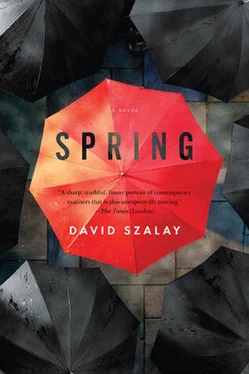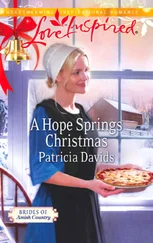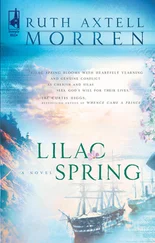Omar was just telling Isabel about the merry-go-round when Steve appeared in the French windows, with frayed half-moons trodden out of the heels of his jeans and plump pale little Scheherazade in his arms. They had been out on the Heath—Scheherazade in her Bugaboo, Steve having a perambulatory script meeting with his friend Pete.
‘Alright, mate,’ he said.
‘Hi, Steve.’
‘How’s things?’
James said things were fine.
He phoned Katherine as he walked down the steep street, under the sheared, leafing elms. Voicemail. He left a message.
*
Emerging from the tube half an hour later, his hope was that she had tried him while he was underground. She had not. The disappointment was so surprisingly potent that he wished he had not phoned her in the first place. He had felt okay leaving Isabel’s house and now he didn’t. He felt very alone.
Philippa Persson thought it would take two days. First thing on Tuesday morning, the house was totally empty. A freshly painted, four-bedroom void. They headed to Neasden in soiled, low sunlight. Katherine was driving. Philippa did not intend to tackle this on her own. She had enlisted her daughter to help.
Kate seemed surprisingly down. She was wearing sunglasses and torn jeans. On Sunday evening they had spoken on the phone for two hours—the Edinburgh post-mortem. Philippa had been pleased to hear that it had been a failure, and pleased that Kate, on the phone, had sounded okay. She had sounded no more than wistful, the persistent numbness of Saturday having thawed to a tranquil sadness. The eight-hour drive down to London, she said laconically, had not been much fun. The parting in Packington Street even less so. Fraser in tears. Philippa had permitted herself a quiet snort at that. She had never liked her son-in-law, had encouraged Kate to have nothing to do with him from the start, when he was still married to that other woman. Naturally she did not let on how pleased she was that the Scottish weekend had been a failure. She made sympathetic mooing noises while Kate said that in Edinburgh she had found Fraser tired, tedious, frightened, sad… Sad, she said, that was the worst thing. The way he was so sad. For her part, Philippa said things like, ‘Well, maybe it’s for the best…’ She said, ‘You tried, Kate. Now I think it’s probably time to move on…’ Time to move on … She had been saying that for more than a year. And now, thankfully, the whole thing did seem to be over. As Kate herself put it, ‘The love is dead.’ She said it quite simply. ‘The love is dead.’ That was just how it felt. The sense she had was of silence, nullity, non-existence. On Sunday night she was just pleased to be home and she slept well.
On Monday morning she felt shockingly worse. There was a serious faltering of the idea that this was not something massively significant. She struggled through the day at work. In the evening she was supposed to meet some people, but the idea of pretending to be okay, of pretending to be interested in other things, was impossible. She went straight home.
Tuesday. Still on a frighteningly steep downward trajectory. A terrible sense of futility. What was the point? The love was dead. In a way she was thankful that she had something mindless to do. Drive to Neasden. Push the obese trolley through Ikea wearing shades. Smoke in the car park under the huge suburban sky, the massing chrome-fendered clouds. Whenever Philippa asked for her opinion, though— These hand towels or those hand towels? Darling, which hand towels do you think…? — she just shrugged. She just muttered, ‘I don’t know.’
She snapped, ‘Mum, I don’t know. ’
‘Whatever,’ she said.
She was thirty-two. She felt half that.
On Tuesday morning, they did Ikea. They did it. The long Peugeot estate was overloaded as it waddled onto the North Circular. And Philippa wasn’t just taking the first thing she saw. She would spend twenty minutes on the towels, ten on the toilet seats, half an hour on the light fittings. There were the soap dishes, the mirrors, the laundry hampers. The list of necessities seemed endless. Not everything was from Ikea. Over the next two days, many other shops were involved—mostly in their vast, out-of-town interpretations, skirted with acres of parking space. John Lewis weighed in heavily, for instance. It was there that Katherine’s head started to throb as she was asked to look at forty different irons and make a decision. Two dozen toasters—which was it to be? Do we need a pizza slicer?
At two o’clock on Tuesday afternoon they unloaded the morning’s shopping at the house, where Katherine’s younger brother, Marc, an MBA student at the London Business School, was waiting for the various deliveries—the fridge-freezer, the washing machine, the sofas. The house was in West Kensington, past Olympia, the wrong side of the tracks. Nevertheless, Philippa was hoping for two thousand a week. That was why all the stuff had to be ‘nice’. Even the hoover had to be ‘nice’. (They found a nice one in John Lewis.) ‘Have you been smoking pot in here?’ she said to Marc, as she started down the stairs to the kitchen.
‘No…’
‘What’s been delivered?’
‘Nothing yet.’
‘ Nothing? I’d better phone them.’
While she made some sharp enquiries into the whereabouts of her things—‘Yes, you said between eight and two. It’s now twenty past and there’s no sign of them…’—Marc had found the Waitrose bag and was eating a lobster sandwich. Katherine was out on the patio smoking a Marlboro Light.
That afternoon they spent mainly in John Lewis (an hour among the lamps, two among the linens), and it was dark—in spite of Sunday’s shift to summer time—when Philippa dropped her in Packington Street. ‘See you nice and early tomorrow,’ she said. ‘We haven’t even started on the living room yet.’ Kate waved at the parting Peugeot and unlocked the door. We haven’t even started on the living room yet … There was something depressing about those words. How much stuff was there in a house? And in every house. To imagine the same mass of stuff they had just spent the day so expensively and systematically marshalling in every house in London, in England, in Europe, in the world… It made her feel queasy and depressed.
On Wednesday morning it was suddenly all too much. She had just parked the Peugeot in the John Lewis lot—they were there again, with much to do—when she found herself in tears.
‘Darling?’ Philippa said. ‘What is it?’ Philippa was not at her most assured in these situations. She put out a hand. ‘What is it?’
Katherine shook her head.
She had shed a few tears the previous night when, having let herself into the flat, she opened her mail. Among various other mailshots were two appeals for money. (Her small portfolio of monthly direct debits—a sponsored orphan in Sri Lanka, the RSPB, Shelter—meant that she was flooded with further appeals. The hungry, the persecuted, the terminally ill—every day she hurried them into the plastic tub on the kitchen floor.) One was something to do with polar bears, whose unique and pathetic plight was well known. The other, orang-utans. They were shamelessly sentimental. The polar-bear one featured a picture of a sad-looking mother and her young. The other was about an orang-utan orphaned at only a few months old—and thus presumably doomed—in some sort of logging incident. They tried to make the point, those well-meaning flyers, that while things were terrible, they were not yet hopeless. Weren’t they though? They seemed hopeless to her as she stood next to the table in the living room, shedding her few surprising tears. What was the point of even pretending? The straight line that led from how she had just spent the day to what was happening in the Arctic, in the Indonesian jungle—what was left of it—was too obvious to overlook, whether she wanted to or not. And it was equally obvious which was the stronger force, the stronger by many orders of magnitude—those sentimental leaflets or the force they were up against. Her. Katherine Persson. She was the stronger force, and there was simply no way it was going to be stopped.
Читать дальше












